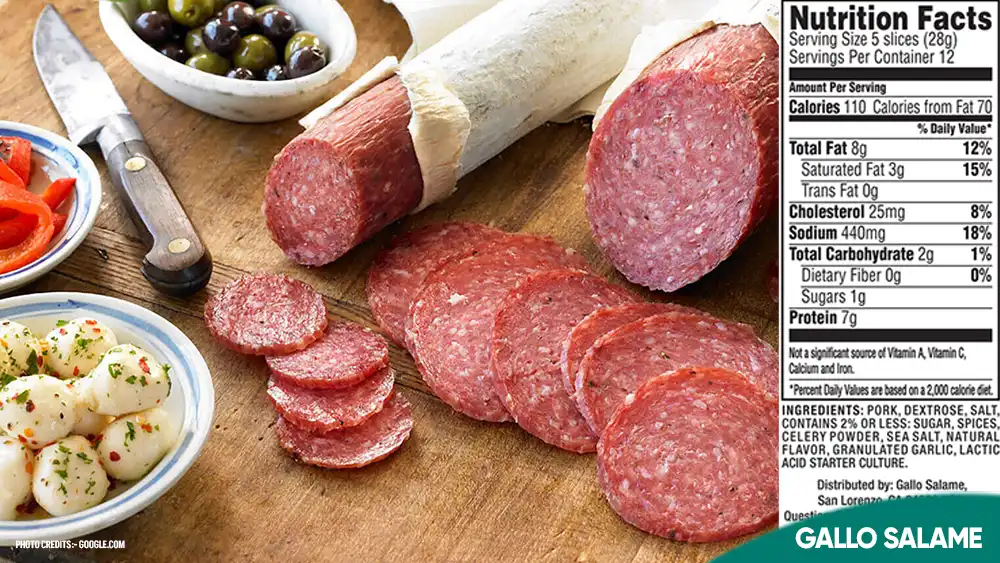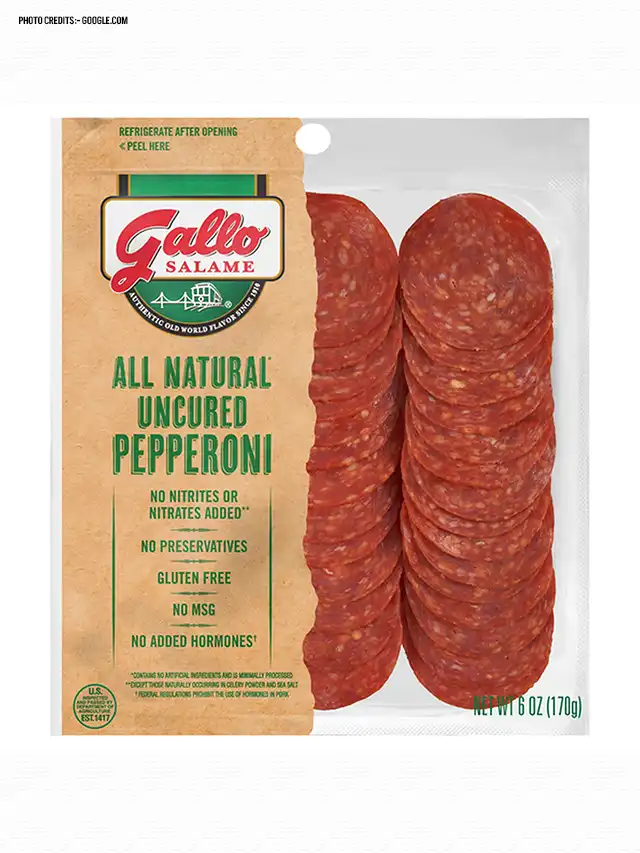
HEALTH BLOG
Is Gallo Salame Gluten Free? Your Guide to Safe Eating
-
Rahul Priydarss
Curious about whether Is Gallo Salame is gluten free? Discover the answer in our comprehensive guide. Gallo Salame is generally considered gluten-free, as it’s made with high-quality meats and spices without gluten-containing ingredients. This makes it suitable for individuals with celiac disease or gluten intolerance. However, due to potential cross-contamination risks, checking product labels for gluten-free certifications is crucial. Learn more about Gallo Salame’s gluten-free status, the importance of verifying labels, and how this beloved salami fits into a gluten-free diet. Find out if Gallo Salame meets your dietary needs and enjoy your salami worry-free.
Introduction of Gallo Salame:
Gallo Salame is a renowned brand in the world of cured meats, known for its rich history and commitment to quality. Founded in 1910 by Louis Gallo in San Francisco, California, Gallo Salame quickly became synonymous with authentic, Italian-style salami. The company’s dedication to traditional methods of curing and aging, combined with the use of premium cuts of pork and a blend of natural spices, has made Gallo Salame a favorite among consumers who appreciate the flavors of genuine, old-world salami. Today, Gallo Salame continues to uphold its legacy, offering a variety of salami products that cater to both classic and modern tastes.
What is Gallo Salame?:
Gallo Salame is a brand of cured meat, specifically known for its Italian-style salami. Established in 1910, the brand has built a reputation for producing high-quality salami using traditional methods. Gallo Salame is made from premium pork, seasoned with a blend of spices, and carefully aged to develop its distinctive flavor. It is a popular choice for charcuterie boards, sandwiches, and various culinary dishes, offering a rich, savory taste that reflects its authentic, old-world roots.

Table of Contents
Importance of Gluten-Free Diets:
Gluten-free diets are essential for individuals with celiac disease, gluten sensitivity, or wheat allergies. For those with celiac disease, consuming gluten—a protein found in wheat, barley, and rye—can trigger an immune response that damages the small intestine, leading to nutrient malabsorption and various health issues. A gluten-free diet helps manage symptoms and prevent complications by eliminating gluten-containing foods.
Beyond medical necessity, some people adopt gluten-free diets for potential health benefits, such as improved digestion and increased energy. However, it’s important to approach this diet with care, ensuring nutritional balance, as gluten-free products may lack certain vitamins and fiber typically found in gluten-containing grains.
History and Origins of Gallo Salame:
Gallo Salame traces its history back to 1910 when it was founded by Louis Gallo in San Francisco, California. Louis Gallo, an Italian immigrant, brought with him the traditional methods of salami making from his homeland. He started Gallo Salame with a commitment to producing authentic, Italian-style salami using time-honored techniques.
The company quickly gained popularity in the Bay Area for its high-quality, flavorful salami. Gallo’s dedication to using premium cuts of pork, natural spices, and a careful aging process set the brand apart from others. As demand grew, Gallo Salame expanded its production while still maintaining its artisanal roots.
Over the years, Gallo Salame became a household name, recognized for its consistency and authenticity in the world of cured meats. Despite its growth, the brand has stayed true to its origins, continuing to produce salami that reflects the rich heritage of Italian salumi, making it a staple in American homes for over a century.
What is Gluten?:
Gluten is a group of proteins found primarily in wheat and related grains, including barley, rye, and spelt. It gives dough its elasticity, helping it rise and maintain its shape, and gives baked goods a chewy texture. The two main proteins in gluten are glutenin and gliadin. When flour is mixed with water, these proteins form a sticky network that provides the structure in bread and other baked goods.
While gluten is harmless for most people, it can cause health issues for those with celiac disease, non-celiac gluten sensitivity, or wheat allergies. In such cases, consuming gluten triggers various symptoms, ranging from digestive discomfort to severe immune reactions.
Common Sources of Gluten in Food:
Gluten is commonly found in a wide range of foods, particularly those made with wheat, barley, or rye. Here are some of the most common sources of gluten.
Breads and Baked Goods: Most breads, rolls, cakes, cookies, and pastries contain gluten because they are made with wheat flour.
Pasta: Traditional pasta, noodles, and macaroni are typically made from wheat flour.
Cereals: Many breakfast cereals, particularly those made from wheat, barley, or rye, contain gluten.
Pizza Dough: Pizza crusts are often made from wheat flour, making them a common source of gluten.
Crackers and Pretzels: Most crackers, pretzels, and similar snacks are made with wheat and contain gluten.
Beer and Malt Beverages: Beers and other malt beverages usually contain barley, which is a source of gluten.
Gravy, Sauces, and Dressings: Many sauces, gravies, and salad dressings use wheat flour as a thickener or contain malt vinegar, which includes gluten.
Processed Meats: Some processed meats, like sausages, deli meats, and meat substitutes, may contain gluten as fillers or binding agents.
Soups and Broths: Some canned or pre-made soups and broths use wheat-based thickeners or barley.
Snack Foods: Certain chips, flavored snacks, and snack bars may contain gluten, either from the seasoning or the base ingredients.
Oats: While oats themselves are gluten-free, they are often processed in facilities that handle wheat, leading to cross-contamination.
Risks For Those With Gluten Intolerance or Celiac Disease:
For individuals with gluten intolerance or celiac disease, consuming gluten can pose significant health risks. In those with celiac disease, an autoimmune disorder, gluten triggers an immune response that damages the lining of the small intestine. This damage impairs nutrient absorption, leading to various symptoms such as diarrhea, bloating, fatigue, and weight loss. Over time, continued gluten exposure can result in serious complications, including anemia, osteoporosis, infertility, neurological disorders, and an increased risk of certain cancers. For those with non-celiac gluten sensitivity, consuming gluten can cause similar symptoms, though without the intestinal damage seen in celiac disease. Nonetheless, these symptoms can significantly impact quality of life, causing discomfort, digestive issues, and chronic fatigue. The only effective treatment for both conditions is a strict, lifelong gluten-free diet, which can be challenging to maintain due to the prevalence of gluten in many foods and the risk of cross-contamination. Adhering to a gluten-free diet is crucial to managing symptoms and preventing long-term health complications.
Is Gallo Salame Gluten Free:
Gallo Salame products are generally gluten-free, making them suitable for individuals with celiac disease or gluten intolerance. The company typically uses only meat, spices, and curing agents in its salami, without any gluten-containing ingredients. However, it’s important to check the packaging for specific labels or certifications that confirm the product is gluten-free. Additionally, because of potential cross-contamination during processing, it’s always wise to review the ingredient list and any allergen information provided on the label to ensure the product meets your dietary needs.
Ingredients used in Gallo Salame:
Gallo Salame typically uses the following ingredients.
- Pork: The primary ingredient, usually high-quality pork cuts, are used to make the salami.
- Salt: Essential for flavor and as a preservative to cure the meat.
- Spices: A blend of spices, such as black pepper, garlic, and paprika, is used to enhance the flavor of the salami.
- Curing Agents: Ingredients like sodium nitrate or sodium nitrite are used to cure the meat and prevent spoilage, while also contributing to the salami’s characteristic color.
- Sugar: Often included in small amounts to balance the flavor and aid in the curing process.
- Wine or Vinegar: Sometimes used for additional flavor and to assist in the curing process.

Health Benefits of Choosing Gluten-Free Salame:
Choosing gluten-free salame can offer several health benefits, particularly for those with gluten-related conditions. For individuals with celiac disease or non-celiac gluten sensitivity, consuming gluten-free salame helps avoid adverse health effects such as digestive issues, fatigue, and nutrient deficiencies. By selecting gluten-free options, these individuals can enjoy a wider variety of foods without the risk of triggering symptoms or damaging their gastrointestinal health.
Additionally, gluten-free salame often means fewer processed ingredients and potential allergens, leading to a cleaner ingredient profile. This can contribute to overall better health, as individuals with gluten intolerance might be more conscious of the foods they consume. Furthermore, a gluten-free diet that includes quality products like gluten-free salame can help maintain a balanced diet, supporting overall well-being and energy levels.
However, it’s important to remember that gluten-free salame, like all processed meats, should be consumed in moderation. While it eliminates gluten, it may still contain high levels of sodium and preservatives. Therefore, incorporating it as part of a balanced diet and focusing on overall nutritional intake is crucial for optimal health.
Varieties of Gallo Salame:
Gallo Salame offers a range of varieties to cater to different tastes and preferences. Some of the key varieties include.
- Traditional Salame: The classic Gallo Salame, made using traditional methods with a blend of spices and natural curing processes, provides a rich, authentic flavor.
- Pepperoni: A popular type of salame known for its spicy kick, made with a blend of paprika, black pepper, and other spices, perfect for pizzas and sandwiches.
- Mild Salame: A version with a milder flavor profile, suitable for those who prefer a less intense taste while still enjoying the rich, savory qualities of salame.
- Garlic Salame: Infused with garlic for a distinctive, robust flavor, this variety adds a unique twist to the traditional salame taste.
- Hot Salame: Featuring a spicier flavor with additional chili peppers or hot spices, this variety is ideal for those who enjoy a bit of heat in their salame.
Customer Reviews for Gallo Salame:
Customer reviews of Gallo Salame generally highlight its quality, flavor, and authenticity. Many reviewers appreciate the rich, traditional taste and the high-quality ingredients used in the salame. Customers often mention that the salame has a satisfying texture and is a great addition to sandwiches, charcuterie boards, and other dishes.
Positive reviews frequently commend the brand for maintaining consistency and offering a variety of flavors, catering to different preferences from mild to spicy. The authentic Italian-style salami is particularly praised for its ability to deliver a genuine taste experience.
On the downside, some reviewers have noted concerns about the price, with a few mentioning that it is higher compared to other salami brands. Additionally, there may be occasional comments about the availability of certain varieties in different regions.
Alternatives to Gallo Salame:
If you’re looking for alternatives to Gallo Salame, several other brands and types of salami offer similar qualities and flavors. Here are a few options to consider.
Hormel Genoa Salami: Known for its classic, tangy flavor, Hormel Genoa Salami is a popular choice for sandwiches and charcuterie boards.
Boar’s Head Salami: Boar’s Head offers various salami options, including Genoa and Soppressata, which are praised for their quality and rich taste.
Columbus Craft Meats: Columbus provides a range of salami varieties, including traditional and spicier options, crafted with high-quality ingredients.
Olli Salumeria: Specializing in artisanal cured meats, Olli offers a range of salami with distinctive flavors and high-quality craftsmanship.
Applegate Natural Salami: Applegate is known for its natural and organic meats, including salami varieties that cater to those seeking cleaner ingredient profiles.
Creminelli Fine Meats: This brand offers artisanal salami with a focus on traditional methods and high-quality ingredients, available in various flavors.
Sahlen’s Salami: Sahlen’s provides a range of salami options with a focus on traditional recipes and quality ingredients.
FAQs about Is Gallo Salame Gluten Free?:
A1: Yes, Gallo Salame is made with gluten-free ingredients, but always check the label for any changes and be mindful of cross-contamination risks.
A2: Read the product label carefully, look for gluten-free certification, and contact the manufacturer if you have any doubts.
A3: Various gluten-free salame and sausage brands are available, such as Applegate and Boar’s Head, which offer certified gluten-free options.
A4: While Gallo Salame uses gluten-free ingredients, it is not certified gluten-free. Those with celiac disease should be cautious and check for any cross-contamination warnings.
A5: Gallo Salame is praised for its taste and quality but lacks the gluten-free certification that some other brands offer. Consumers should weigh this when making their choice.

-Please remember, to always consult with healthcare professionals or Doctors for personalised advice related to medical conditions.
Conclusion:
In conclusion, when asking “Is Gallo Salame gluten free?”, the answer is generally yes. Gallo Salame is made with ingredients that do not contain gluten, making it suitable for individuals with gluten intolerance or celiac disease. The brand uses high-quality meats and spices without gluten additives. However, due to potential cross-contamination risks during processing, it’s essential to check the product label for any gluten-free certifications and be cautious if you have severe gluten sensitivities. While Gallo Salame typically aligns with gluten-free dietary needs, verifying each product’s details ensures it meets your specific requirements.




